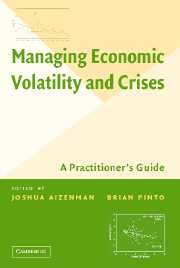Foreword
Published online by Cambridge University Press: 25 July 2009
Summary
The last half century has seen an unprecedented number of financial crises and periods of great price and output volatility. Slightly removed in time from the events, researchers are now carefully documenting the events and learning from them. This volume is a landmark in that research process. Joshua Aizenman and Brian Pinto have put together a group of cutting-edge researchers and had them stand back and assess what has been learned. Since it is my specialty, I will concentrate my remarks on the crisis part of this volume.
Country particulars and fine technical points aside, two simple lessons seem robust. One lesson is that financial crisis and volatility come in waves. First they hit one country, then the next in close succession. The second lesson is that the next wave of crises is sure to be different from the last. Studying past financial turmoil has an important element in common with studying past wars. Military historians record and analyze battles to discover how they could have been fought better. Potential enemies do the same. The next war, therefore, will surely be different from the last one and it will be different in ways intended to surprise the participants. The great lesson we draw from studying military history is to expect surprises. This lesson turns out to extend to financial crises. Money is made and money is lost in the crises. Those who lost money set up protections, like deposit insurance, so as not to lose in the same way twice.
- Type
- Chapter
- Information
- Managing Economic Volatility and CrisesA Practitioner's Guide, pp. xiii - xviPublisher: Cambridge University PressPrint publication year: 2005



